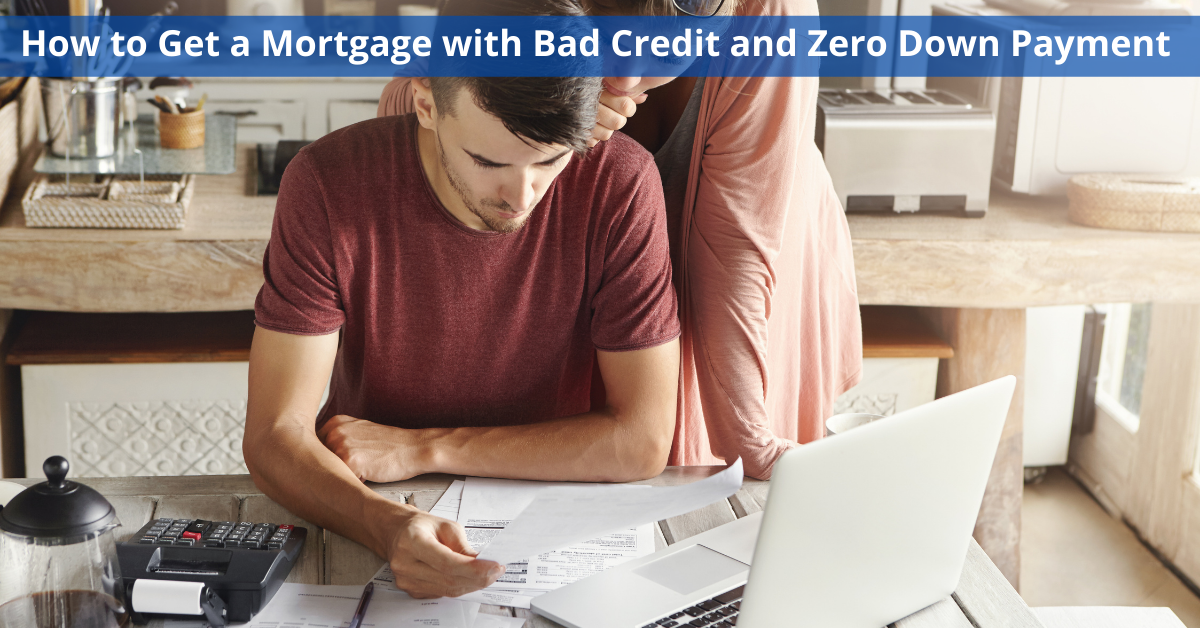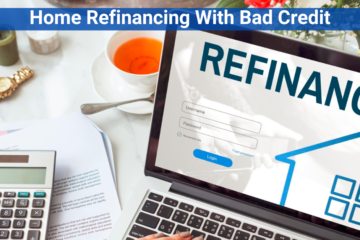One of the advantages of having a good credit score standing is access to a greater mortgage, whether you’re purchasing a home or a business loan. But having a poor credit score doesn’t mean a distant way around. You can get one by different options you can select in getting your mortgage.
However, there are things you should consider. Our financial journey includes not only the ability to buy something immediately. There are ways to grasp our needs in a time frame. Having a bad credit mortgage is a typical scenario for everyone.
On the other hand, this doesn’t mean you will settle on this for a lifetime. You will have to regain your score for more access and trust. Both borrower and the lender take risks wherein you have to be qualified to repay them.
In this article, we will discuss how to apply for a mortgage with a low score, how to qualify with mortgage insurance, and if it’s possible to get a mortgage without a down payment or if a large down payment offsets your poor credit score.
First, let’s walk through the credit score ranges so that you can check and find your situation.
| Credit Score Range | Credit Health | Available Mortgage Lenders |
| 750+ | Excellent | Low rates mortgage companies and banks |
| 700 – 749 | Good | Low rates mortgage companies and banks |
| 650 – 699 | Fair | Mid-range mortgage rates from mortgage companies and some banks |
| 550 – 649 | Poor | Mid – high range mortgage rates from mortgage companies |
| Below 550 | Bad | High interest rates range mortgage companies |
To check your credit score and report, you can visit Equifax and Transunion (Canada’s two main credit rating agencies in Canada). It’s better to check one way or the other so you can compare the details and have it clear once you find an inaccuracy.
A score below 600 is a low score in which mortgage lenders let you borrow money with higher mortgage interest rates, so you need to regain your score. The minimum credit score required for a mortgage is 600 for low rates mortgage companies and banks, 550 for mid-range mortgage rates from companies and banks, no minimum credit score requirement for high-interest rates range mortgage companies.
Mortgage Lenders Available that Will Work for You
1. LOW RATES MORTGAGE COMPANIES AND BANKS
These are banks or trust companies federally and provincially regulated along with credit unions. These lenders typically lend borrowers with a good credit score, history, and stable household income.
2. MID-RANGE MORTGAGE RATES FROM MORTGAGE COMPANIES AND SOME BANKS
These are the institutional lenders that are not directly regulated federally but indirectly following regulations as part of the nature of their business. Commonly straightforward to calculate household income and let people borrow even with a bad score.
3. HIGH-INTEREST RATES RANGE MORTGAGE COMPANIES
These private corporations and individuals lend their own money without being federally or provincially regulated. No minimum credit score requirement is needed but be careful as they have high mortgage interest rates.
Suppose you find yourself in a problematic situation applying for a poor credit mortgage. You see, most low rates mortgage companies and banks are only allowing borrowers who have good credit standing. In that case, the available alternative lenders are your best choices that will help you translate your desired mortgage into reality.
Mid-range mortgage rates from mortgage companies and some banks and High-interest rates range mortgage companies offer different options that suit your preferences and situation.
Now that you have known some of the vital information to take note. The question is:
Can I Apply For a Mortgage with a Bad Credit Score?
Yes! Having a bad credit score may seem to be a limitation to access a higher mortgage amount, and it determines your qualifications in having one. The available mortgage products rely on your credit score standing. However, the different score gives different options.
For example, you’re buying a home, and if you have a score below 600 and can make a down payment for at least 20% of your desired mortgage, you can qualify for Mid-range mortgage rates from mortgage companies and some banks or High-interest rates range mortgage companies.
If you can’t make the said payment, it will be hard for you to qualify, and you will need a professional mortgage broker to help you get through your mortgage application that will also help you see available options for you.
Here are a few steps in making your bad credit mortgage approved a little easier.
1. Larger Down Payment
When you put time and effort into investing in your down payment, the more chances your lender will approve you with a reasonable interest rate. However, be informed of the CMHC insured mortgages or the Canada Mortgage and Housing Corporation, which insures or protects the mortgage lenders once you fail to repay your mortgage.
This happens when you have a credit score of less than 600 and you’re having late and missed timely payments or never paying at all. They will address you as riskier to qualify for their mortgage insurance.
The CMHC insurance allows you to make a smaller down payment on your desired mortgage for as low as 5% as a high ratio mortgage to guarantee the mortgage lender that you’re able to pay.
Take note that without CMHC insurance, you’re more likely to get a higher interest rate, and you are required to make a down payment of at least 20% for your home equity loan.
2. Find A Trusted Guarantor or Co-Signer
Seeking support is an excellent strategy to do when it comes to mortgages. This option could be a help from a family member or a friend you trust the most with a strong credit score and history to co-sign the mortgage application, making the lender more confident with you, borrowing with bad credit.
It lessens the risk for the mortgage lender in accepting you.
3. Consult a Mortgage Broker
Finding someone qualified to help you is a great idea to consider. These professionals tie the borrower and the bad credit mortgage lender wherein he’s responsible for searching available options that will best fit and work on your financial situation.
These experts assist with the requirements needed in your application, client fee management up to your mortgage approval. Most importantly, they have the best deal from mortgage lenders to offer you that will save you time and to have at least a fraction of peace and focus on more advanced responsibilities you have.
4. Look for a Private Lender/High-interest rates range mortgage companies
While this could be the best option for everyone having a poor credit score because it does not require good credit score standing.
In other words, a loan is still possible even with a low credit score, and this option provides you convenient deals without worrying about your credit score status compared to other lenders. But take note that you should be ready with the higher interest rates this can offer you. These high rates reflect the financial ability of the borrower.
Most Private lenders offer you 7% to 12% mortgage rates depending on your financial situation. Picking private mortgage lenders will also enable you to refinance your mortgage easier in due time if you don’t miss any of their payment agreements. As a result, you will have the chance to regain your score in the fast way possible.
In addition, refinancing your mortgage is a good strategy that most people should know. It is getting another mortgage with a lower interest rate and a lesser time frame to pay your existing mortgage.
What Credit Score Do I need To Buy a House with No Down Payment?
Minimum down payment ranges from 5%, 10%, to 20% depending on the purchase price, and you’ll be needing a credit score of at least 650.
Buying a home without a down payment saved but doesn’t mean that you will not make a down payment at all. It implies that you will not use your hard-earned money and saved cash to pay the down payment.
It means you will be borrowing your down payment for at least 5% in Ontario, Canada, which also means you’re taking on even more and higher debt. That’s why you must be in good financial standing before you take on even more debt than necessary.
It’s still possible to get a mortgage without a cash down payment by borrowing the minimum down payment. To get one, we have the so-called Flex Down that requires you to use your credit card or another line of credit to borrow your minimum down payment.
What is the minimum down payment required in Canada?
The minimum down payment in Canada depends on the property’s purchase price.
If you purchase a property with a price of less than $500,000, your minimum down payment is 5%.
If you purchase a property between $500,000 and $999,999, minimum down payment is 5% for the first $500,000, and 10% for any amount over $500,000.
Purchasing a property with a price of $1,000,000 or more requires a minimum down payment of 20%.
How Does a Mortgage Without a Down Payment works?
This type of option works the same with borrowing a standard mortgage, but the difference is your mortgage lender will be covering both your mortgage and your down payment.
The only fees you must pay are the regular closing cost: land transfer tax, PST mortgage loan insurance premium, legal fees, and title insurance, which all depend on the price market per localities.
On the other hand, the government forbids Canadians to borrow their down payment from their lender. If their lenders are banks or federally regulated financial institutions, you’ll need to find an alternative lender to grant you a down payment.
You can have types of loans to use as your down payment, such as having a personal loan, borrowing from a friend or a family member, or through your line of credit.
How To Get a Zero Down Payment Mortgage?
These are the key points you need to land a mortgage without a down payment.
-
It would help if you had Flex Down lender
This is an excellent option to get a no down payment mortgage which you’ll choose to borrow your down payment for at least 5% through a loan or a line of credit separate from your original loan. However, not all mortgage lenders offer this kind of option, so you’ll need to find one that does.
-
It would be best if you had a good credit score standing
You’re expected to have a credit score of 650 above, healthier than the average borrower to get approved for a no down payment mortgage.
-
Excellent credit history
Your lender will want to see your credit and payment history, which means no missed payments because they want to be confident at how you could handle your finances to repay them in this risky setup. Your credit score and history reflect if you’re a good borrower or not.
-
Sufficient and stable income
This serves as proof that you can cover your payments through your income, which is more likely expected to be stable. Your chance of getting approved is possible if your income stream is secured.
This mortgage with zero down payment option might work for you or not, but you have to weigh your financial situation, especially if you’re able to take risks. For some, this would not be an ideal way to purchase a home since this will bring you to more debt.
You might want to save a down payment before taking action. However, this is possible if you have met the notes above, particularly having a firm income stream.
Considering a mortgage broker could help you assess your situation and decision-making. A piece of expert advice is more likely needed for this type of risk before you go ahead.
How Do I know if I qualify for CMHC Insurance Mortgage?
Before we discuss the qualification for CMHC Insurance mortgage, it is first beneficial if you have known some of the essential keys to note. Let’s start with what is CMHC and what is mortgage default insurance.
Canada Mortgage Housing Corporation (CMHC) is defined as the national housing agency in Canada or a state-owned enterprise that provides a scale of services for home buyers and the housing market industry. They facilitate accessible and affordable housing, providing mortgage insurance and financial assistance programs for Canada’s public and private housing organizations.
Mortgage default insurance or CMHC mortgage insurance protects lenders from the risk when the borrower defaults or stops paying on their mortgage loans. It is a requirement on all mortgages with less than 20% down payment (high-ratio mortgages). CMHC premium insurance should be paid upfront, at the start of your mortgage.
This costs home buyers generally between 2% – 4% added to the overall mortgage amount. For instance, with a higher ratio mortgage amounting to $500,000, your CMHC premium insurance is anywhere between $10,000 and $20,000.
You can use a mortgage payment calculator to determine your CMHC insurance for a particular mortgage. Lenders offer lower mortgage rates when a mortgage is protected with CMHC insurance because the risk is passed to the insurer.
Qualifying for Mortgage Default Insurance
To qualify for mortgage default insurance, you have to meet some of the requirements such as:
Twenty-five years is maximum amortization for insured mortgages.
If you purchase a property between $500,000 and $999,999, that means a higher down payment is required. The minimum down payment is 5% for the first $500,000 and 10% for the remaining balance.
For more than $1,000,000 home purchased, mortgage default insurance is unavailable, which means 20% or higher down payment is required and expected.
Can a Large Down Payment Offset Bad Credit?
A down payment is an amount you pay upfront in the financial transaction intended to buy expensive services or an item through borrowed funds (mortgage). The larger the down payment, the better appeal to the lenders. But, unfortunately, it doesn’t necessarily offset your bad credit nor remove the effects of bad credit.
A large down payment with a low credit score can encourage a lender to grant you a loan. At the same time, a combination of low-down payment and a low credit score can be too risky for them.
While you still think of the approval of having a large down payment with bad credit, one thing you can do is to offer an alternative deal with your lender so that you’ll have the trust of securing the funds through providing a large down payment. A larger down payment could reduce the interest rates you need to pay throughout your loan journey.
This will serve as an assurance that you’re committed to repaying them. In short, you’re showing that you’re less likely to end up by default.
Lenders pay close attention to your credit score and history, regardless of how much money you set for a down payment. They try to think of possible reasons you have bad credit and use the information to make decisions. However, having a larger down payment can help you with approval chances to get your mortgage.




